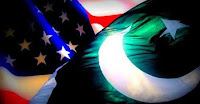Pakistan: Is the country pushed into anarchy?
The blasts taking place in Karachi during this week seem
part of the grand conspiracy to plunge the country deep into anarchy and challenging
writ of the government. Bringing economic
activities to grinding halt in Karachi is aimed at adding to the woes for the
country facing serious balance of payment crisis.
The anti Pakistan forces, in a bid to sabotage general
election scheduled on 11th May, have been attacking meeting of MQM, ANP and the
latest victim is PPP. On Saturday election camps of MQM and PPP, two major
parties of Sindh came under three bombings attacks in Karachi killing at least
five people and leaving more than 40 wounded.
Earlier, at least two people were killed and more than 25
were injured in two separate blasts near the MQM election office in
the city’s Orangi Town area. The first bomb exploded outside a MQM election
office and the second one outside a nearby Shia Imambargah in the area.
The twin explosions were very loud and were heard far away
and damaged the nearby buildings and vehicles. A complete blackout was reported
in the area after the explosions. Saturday’s blast raised the number to five terrorist
attacks in the metropolis, leading death at least 26 people in these attacks. This
prompted observing Sunday as yet another mourning day and bringing industrial
and commercial activities to grinding halt.
Although no group claimed responsibility of both the blasts
but the outlawed Tehreek-e-Taliban Pakistan (TTP) vowed to target PPP, ANP and
MQM. The banned outfit had claimed responsibilities of the Thursday and Friday
attacks, targeting MQM and ANP. Around 11 people were killed and more than 50 injured
when a bomb blast hit the election meeting of ANP candidate Bashir
Jan in Karachi on Friday.
As I have been saying that the sole objective of perpetrators
is to kill people, at least four people were injured when suspected militants
lobbed a hand grenade at an election office of Jamaat-e-Islami (JI) in Sibi
area of Balochistan on Saturday. Meanwhile, the militants hurled a hand grenade
at the office of Jamiat Ulema-e-Islam-Fazl (JUI-F) candidate in Panjgoor area
of Balochistan.
The perpetrators want to ensure deferring election by
undertaking killing and terrorizing people so that they don’t come out of their
houses to cast their votes. Some of the fanatics have already termed casting
vote un-Islamic and also warned those not following their instructions can face
stern consequences.
When MQM announce to observe mourning day life in Karachi comes
to grinding halt. It is true that the party loves its members and if a few are
assassinated, it requests all to observe mourning day. Not only areas where it
has a large vote bank, but where its followers live just don’t open shops and
schools and public transport also remain off road. This is a great sign of
unity but its darker side also needs to be looked at.
First and most important,when MQM workers and supporters are
killed and educational and commercial activities in its areas of concentration
also remain closed it is ultimate loss of its vote bank, mostly belongs to
middle and lower middle class. Millions of people that worker on daily wages
faces starvation. When factories remain closed no revenue is collected and
disturbance in clearing of goods at ports, disrupt supplies throughout the
country.
Historically, those sitting on opposition benches give strike
calls but it does not suit MQM as it remained in power for nearly two decades
and also enjoy access to power corridors. It should be influencing the district
management and law enforcing agencies to ensure peace throughout the country.
It has the largest ‘street power’ and youth which should be keeping a watch on
criminals.
It is in common knowledge that criminals come to Karachi to
accomplish tasks given to them. These include killing of people, undertaking
blasts through improvised explosive devices (IEDs) and kidnapping of people for
ransom. These elements have permanent hideouts in areas of ethnic concentration
and also use residents of the areas as ‘human shield’. Once their mission is
accomplished they go back to their home towns and wait for the next
‘assignment’.
It is also on record that arms are also brought into Karachi
from up country and sold openly. To the utmost surprise there are ‘rent a
weapon’ shops in certain areas. Ironically, law enforcing agencies are not
allowed to undertake any operation in certain areas by the political parties,
which draw strength from these unscrupulous elements. Even if a few are rounded
up, their ‘godfathers’ arrange the bails and get them free. In the worst
scenario if brought to courts of law, they are acquitted due to
‘non-availability of credible evidence’.
Strange is the attitude of law enforcing agencies that fail
to arrest those claiming responsibility of blasts and killings innocent
citizens, most notorious are Taliban, TTP and LeJ. It is on record that Taliban
had said ‘we would free Karachi which has become hostage of MQM’ and have also
claimed responsibility of killing MQM activists.
It is often said that now militant groups are embedded in
law enforcing agencies and one has to believe that. According to some estimates
from 25,000 to 50,000 people have been killed in Pakistan by these militants
and extremists groups but hardly any killer has been hanged. Some cynics even
go to the extent of saying that these accused remain in jail and spend most
luxurious lives for years and are finally acquitted.
I one of the TV shows Faisal Abidi of PPP has raised a
question why activists of PPP,MQM and ANP are being targeted and members of JI,
PML-N and other religious parties are not being attacked. He himself also
provided the reply that those parties not been attacked enjoy very cordial relationship
with these banned outfits, which are also rewarded appropriately.





